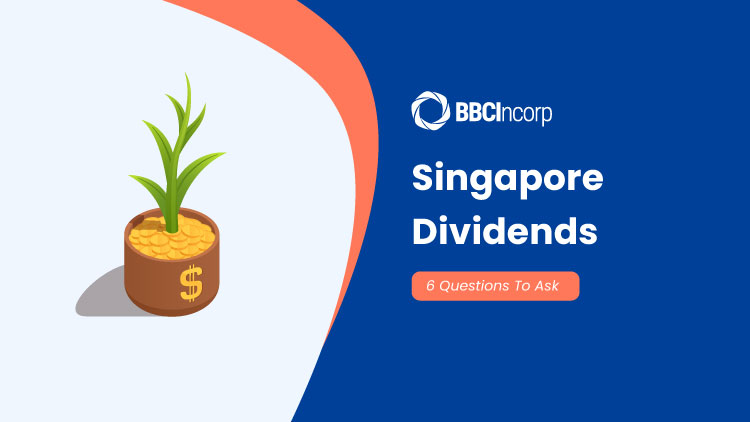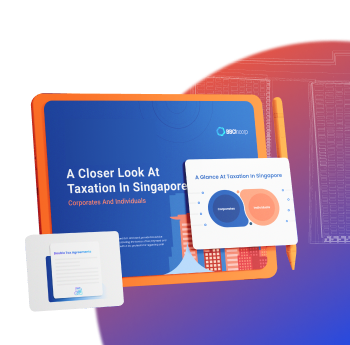
- What are dividends in Singapore?
- Is there any dividend tax in Singapore?
- My Singapore company invests in another Singapore company and receives dividends. Is that dividend income taxable in Singapore?
- My company in Singapore receives dividends from another foreign company. Are those dividends taxable in Singapore?
- My company is located outside Singapore but owns shares in a Singapore company and receives dividends from it. Are those dividends subject to Singapore withholding tax?
- Are there any dividend payment rules in Singapore?
- Summary of key facts about dividends in Singapore
Many foreigners have incorporated a company in Singapore to do international business. One of the reasons is that the dividend policy in this country is very favorable.
Get to know more about Singapore dividends through these 6 questions below!
What are dividends in Singapore?
A dividend is the return payment that you receive for your investment in a company (as a shareholder). A dividend is paid out of a company’s profits and the amount you receive depends on the proportion of shares you hold in such company.
Profits earned by a Singapore company can be either reinvested to expand its business or distributed to you and other shareholders as dividends. Paying dividends is a good way for a company to stimulate its shareholders’ investment and show appreciation for such investment.
Singapore dividends are commonly handed to shareholders in cash. However, it can come under other kinds too, such as shares or other types of property.
Is there any dividend tax in Singapore?
At the individual level, in most cases, Singapore does not put a tax on dividends.
Particularly, Singapore follows a one-tier corporate tax system. As a result, you (as a shareholder) will not pay the Singapore dividend tax when it is paid by a Singapore-resident company. The reason is that the profits from which the dividends are paid have already been subject to corporate tax.
Furthermore, Singapore puts no tax on foreign dividends received by resident individuals in Singapore. Income distributed from Real Estate Investment Trusts (REITs) is also exempted from Singapore dividend tax.
However, there are a few circumstances in which your received dividends are taxable in Singapore. In particular, taxable dividends in Singapore are:
- Dividends paid by co-operatives
- Foreign dividends received by individuals through a partnership in Singapore (exemptions can be granted when certain conditions are satisfied)
- Income distributed from Real Estate Investment Trusts (REITs) derived by individuals through a partnership in Singapore, or from the carrying on of a trade, business, or profession in REITs
My Singapore company invests in another Singapore company and receives dividends. Is that dividend income taxable in Singapore?
Yes, it is. According to IRAS, income from investment (dividends, interest, or rental) is also referred to as the taxable income of a company. So, your company’s dividend income will be included in the total taxable corporate income, which then will be subject to corporate income tax in Singapore.
My company in Singapore receives dividends from another foreign company. Are those dividends taxable in Singapore?
Singapore imposes a tax on the foreign-sourced income of a resident company when it is received in Singapore. And according to IRAS, dividends paid by a non-resident are considered as foreign-sourced.
That said, then yes, the dividends received by your company are taxable in Singapore. However, your company can be exempted from tax imposed on such foreign dividends if the following conditions are met:
- The dividends have already been subject to tax in the foreign country (where the paying company is located) when your company receives the foreign dividends
- The highest corporate tax rate of a foreign country is at least 15% when your company receives the foreign dividends
- The Comptroller of Income Tax is satisfied that the tax exemption would be beneficial to the person resident in Singapore
For the first condition, dividends have been subject to foreign tax when:
- Dividend tax, which is an income tax imposed on the dividend by the foreign-sourced jurisdiction, has been paid (normally your company will suffer from dividend withholding tax); or
- The underlying tax, which is income tax on the income out of which the dividend is paid, has been paid by the dividend-paying company.
My company is located outside Singapore but owns shares in a Singapore company and receives dividends from it. Are those dividends subject to Singapore withholding tax?
No, they aren’t. Singapore only applies to withhold taxes on certain kinds of payments made to non-residents and fortunately, dividends are not included. There is no dividend withholding tax in Singapore (at least up to now, you are good).
Understand the tax basic
Gain more confidence

Are there any dividend payment rules in Singapore?
According to the Singapore Companies Act, Section 403 on dividend payment, your company can only pay dividends out of profits (including carried-forward profits). The company can pay all profits as dividends to the shareholders; however, the paid dividends are not allowed to exceed the total available profits.
As a director, you will be liable to a fine of up to $5,000 or imprisonment of up to 12 months if paying or permitting dividends to be paid when the company generates no profits.
Learn more: How to declare dividends in Singapore
Summary of key facts about dividends in Singapore
- Dividends paid by Singapore resident companies to shareholders are not subject to tax.
- Taxable income of a Singapore company also includes dividend income received from other companies.
- A Singapore company is taxed on foreign-sourced dividend income; however, it can be exempted from such tax if satisfying certain conditions.
- There is no dividend withholding tax in Singapore.
- Dividends in Singapore can only be paid out of the profits of a company.
Should you have any further questions on Singapore dividends, talk to our experts now!
Disclaimer: While BBCIncorp strives to make the information on this website as timely and accurate as possible, the information itself is for reference purposes only. You should not substitute the information provided in this article for competent legal advice. Feel free to contact BBCIncorp’s customer services for advice on your specific cases.
- What are dividends in Singapore?
- Is there any dividend tax in Singapore?
- My Singapore company invests in another Singapore company and receives dividends. Is that dividend income taxable in Singapore?
- My company in Singapore receives dividends from another foreign company. Are those dividends taxable in Singapore?
- My company is located outside Singapore but owns shares in a Singapore company and receives dividends from it. Are those dividends subject to Singapore withholding tax?
- Are there any dividend payment rules in Singapore?
- Summary of key facts about dividends in Singapore
Industry News & Insights
Get helpful tips and info from our newsletter!
Stay in the know and be empowered with our strategic how-tos, resources, and guidelines.





